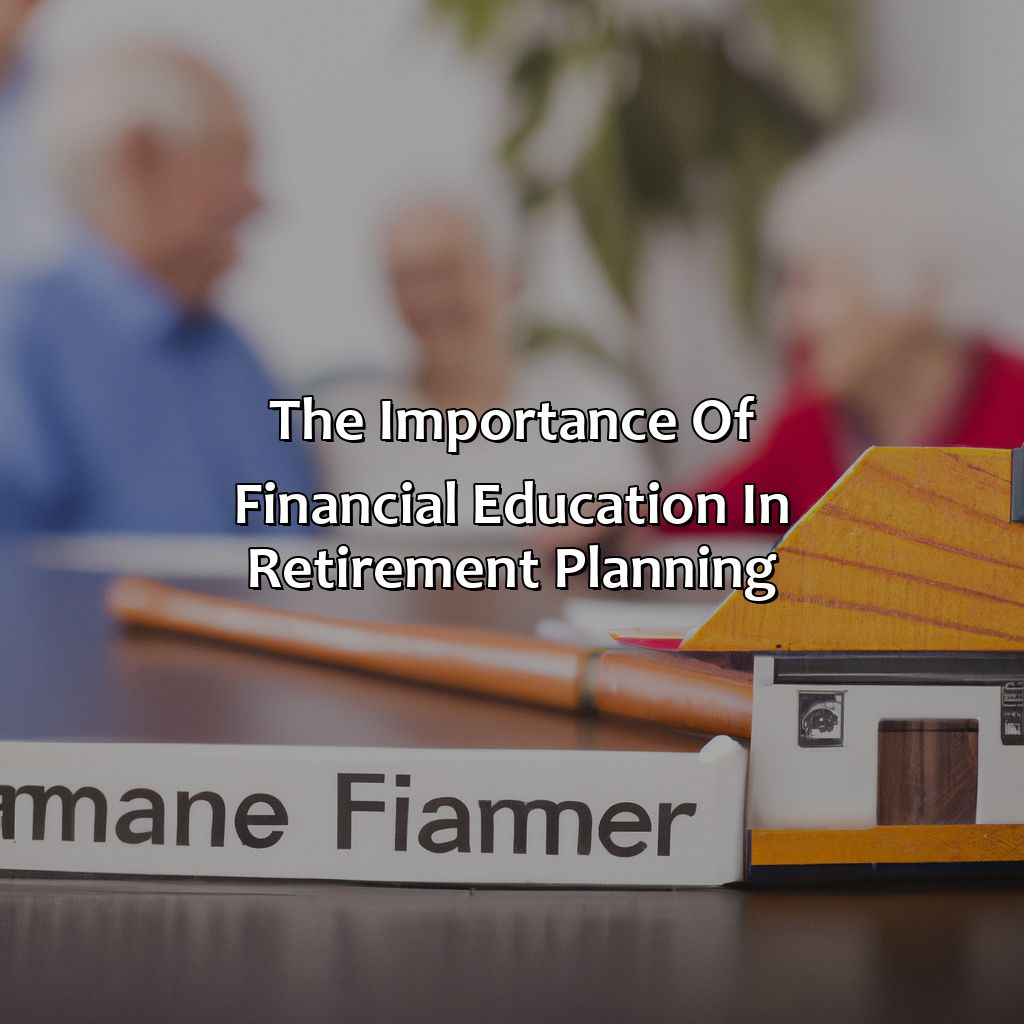Why Saving Money Is Not The Secret To Retirement?
Key Takeaway:
- Relying solely on saving money for retirement is not enough: There are limitations to saving money for retirement as it does not take into account inflation and unforeseen circumstances that could deplete an individual’s savings.
- Exploring alternative ways to prepare for retirement is crucial: Investing in assets that generate income, building passive income streams, and creating a retirement plan that includes various sources of income can provide a more secure path to financial stability in retirement.
- Financial education is essential when planning for retirement: Understanding the value of diversification, the tax implications on retirement income, and seeking professional advice can help individuals make informed decisions and better prepare for a comfortable retirement.
Struggling to plan for retirement and overwhelmed by the countless investment options out there? You’re not alone! In this article, we discuss why saving money alone is not enough to plan for a secure retirement, and explore some of the other considerations to keep in mind.
The problem with relying solely on saving money for retirement
Relying solely on saving money for a secure retirement may not be enough. To understand why, let’s explore this issue.
Firstly, let’s look at the limitations of saving money for retirement.
Secondly, let’s consider how inflation affects retirement savings.

Image credits: retiregenz.com by Joel Arnold
The limitations of saving money for retirement
It’s no secret that saving money is crucial when it comes to retirement planning. However, this approach alone may be limited in providing financial security post-retirement. The risks of inflation, market fluctuations and unforeseen medical expenses can erode the value of savings and strain retirees’ finances. Hence, relying solely on saving money for retirement might not be sustainable long-term.
Instead of just focusing on saving alone, diversification and investment strategies should also be considered. Diversification across multiple asset classes can reduce risk exposure while investments generate potential growth in income streams along with capital appreciation to supplement other sources of retirement income.
Furthermore, the early years leading up to retirement are crucial in building a robust nest egg as one has a much longer time frame for saving and benefiting from long-term compound interest. In contrast, those who have started late may feel the effects of accelerated catch-up contributions and lower returns from deposits as they would miss out on several years of compounded growth.
For instance, Jack saved diligently throughout his career but invested only in low-yielding fixed deposits. During his retirement years though he had accumulated sizable savings, inflation eroded their real value considerably over time. To cope with this unexpected scenario he was forced to make significant lifestyle changes affecting his quality of life.
Retirement savings are like trying to fill a leaky bucket, but with inflation it’s like the bucket is spraying you in the face.
The impact of inflation on retirement savings
The rising cost of living can significantly reduce the value of retirement savings over time, affecting retirees’ financial security. Inflation is a silent killer that eats into the purchasing power of retirement funds, limiting one’s ability to maintain their standard of living in old age.
Without proper planning, inflation can negatively impact retirement plans. The higher the inflation rate, the more crucial it is to plan for it while saving. To illustrate, suppose an individual plans to retire with $500,000 in savings 20 years from now. Assuming a 3% rate of inflation annually, they would need over $900,000 to achieve the same level of purchasing power as what $500,000 affords today.
Retirees should consider using strategies that incorporate high-interest savings accounts and investment vehicles with low fees and stable returns instead of relying solely on saving money for retirement. They should invest in stocks through exchange-traded funds (ETFs) or mutual funds with a diversified portfolio since they have provided strong returns over extended periods historically. Rental property investments offer potential appreciation as well as rent revenues that can act as a hedge against inflation while providing steady cash flow.
Retirement plan tip: Invest in a time machine and go back to convince your younger self to start saving earlier…if only it were that easy.
Alternative ways to prepare for retirement
Retirement prep doesn’t have to be all about saving. Investing in income-generating assets, creating passive income streams and diversifying your retirement plan can all help secure your future. In this section, we’ll discuss the advantages of each – investing, passive income and diversification – so you have multiple retirement options.

Image credits: retiregenz.com by Adam Washington
Investing in assets that generate income
Investing in income-generating assets is a smart way to prepare for retirement. Such investments include stocks, real estate, rental properties and bonds. Not only do these assets provide a steady stream of income but also have potential for capital appreciation.
Diversifying investments across different asset classes reduces the risk of loss and increases the chances of earning higher returns in the long run. One should consider the risk appetite, investment horizon, and personal preferences while choosing such vehicles.
Moreover, investing early allows for greater compounding effects, resulting in significant wealth accumulation over time. Investing in such assets also helps reduce dependence on other sources of income during retirement.
Don’t miss out on an opportunity to secure your financial future. Start investing in income-generating assets today to enjoy financial freedom during retirement. If you want to retire like a king, you better start building passive income streams like a hustler.
Building passive income streams
Passive income sources are an effective way of ensuring a smooth retirement without solely relying on savings. Here are four ways to diversify your income streams and generate passive income:
- Real Estate Investment Trusts (REITs) offer regular dividends with minimal effort required from investors.
- Investing in dividend stock offers extra income while still owning stocks.
- Rental properties provide ongoing rental money after the initial investment.
- Peer-to-Peer Lending enables investors to earn interest on funds lent to borrowers directly.
In addition, several low-risk passive income-generating assets that can complement the above mentioned strategies include:
- Roth IRAs: A Roth IRA plan doesn’t require additional taxes during withdrawal in retirement years, which makes it a straightforward way to get tax-free growth on investments.
- Mutual Funds: Mutual Funds spread risk across many assets via their portfolio method.
- Social Security Benefits: Social security is usually available as an additional source of funds for retirements.
Consider this: John invested in a rental property when he was 35 years old that eventually paid off his initial investment within six years while providing him with significant additional revenue for the next 30 years without further investment or work. By growing his passive income streams via rentals, John was able to save more for his other life goals while enjoying stress-free retirement life brimming with financial security.
Retirement plan tip: Don’t put all your eggs in one pension basket, or you might end up with a scrambled future.
Creating a retirement plan that includes various sources of income
Many people believe that saving money is the key to retirement. However, creating a versatile retirement plan that includes multiple sources of income is equally important. Dependence on solely one source of income can be risky. A wise plan would involve investments, property acquisition or part-time work. A well-rounded post-retirement strategy offers longevity.
It’s essential to consider all potential sources of income while creating a post-work life strategy. Consider investing in rental property locations with reliable tenants, identifying the appropriate investment options among equity shares or bonds and selecting secure long-term savings schemes with attractive returns.
Plan for the unexpected expenses and medical emergencies by researching the medical insurance benefits shortly after retirement. Researching healthcare opportunities will ensure financial stability in later years.
According to Forbes Advisor, “Nearly 1 in 5 Americans postponed or reduced their Social Security benefits because they were still working.” Having other sources of income helps ease the burden on Social Security responsibilities to provide support during an economic recession or uncertainty.
Creating a solid retirement plan that includes various sources of income ensures a comfortable life after work is done without over-relying on any one source.
Retirement planning without financial education is like trying to bake a cake without a recipe – it’s bound to be a disaster.
The importance of financial education in retirement planning
Give retirement planning top priority! To gain financial understanding, explore the importance of diversification. Learn about tax implications on retirement income. Seek advice from professionals. By doing this, create a financial plan that fits you. Don’t just save money.

Image credits: retiregenz.com by Harry Woodhock
Understanding the value of diversification
When it comes to retirement planning, diversification is a crucial factor. A comprehensive understanding of the value of diversification can help individuals manage risk and maximize returns in their investment portfolios. By allocating assets across a range of investments such as stocks, bonds, and real estate, individuals can minimize the impact of market fluctuations on their portfolio.
Furthermore, it’s essential to note that diversification involves selecting investments based on different types of risks, including economic conditions, industry trends, and geopolitical events. Creating a diversified portfolio often requires significant research and analysis to balance multiple factors that can impact financial outcomes.
Investment management firms emphasize the importance of diversification in retirement planning by offering a range of funds with diverse holdings. These funds are an effective way to achieve immediate portfolio diversification without investing time in researching each individual investment.
However, one must understand that creating a diversified portfolio is easier said than done. One real-life example is that of retirees who invested most of their savings in rental properties but were severely impacted when the COVID-19 pandemic halted travel and tourism activities globally. Thus, increasing awareness about investable asset classes through financial education plays an important role in retirement planning rather than saving money alone.
Retirement savings may seem taxing, but ignorance of tax implications can be even more costly.
Knowledge of tax implications on retirement income
Retirees must understand the impact of taxes on their retirement income. Awareness of the tax implications on their pensions, social security benefits, and investments is crucial in developing a plan for their financial future.
The tax code has several provisions exclusively for retirees, such as qualified charitable distribution and Required Minimum Distributions that can offer tax savings. Moreover, opting to work post-retirement and delaying Social Security can substantially reduce taxes.
Retirees can also take advantage of Roth IRA conversion, offsetting capital gains by losses, and changing investments’ location, among others, to potentially minimize their tax burden.
A new retiree withdrawing funds from his individual retirement account without considering tax consequences was faced with an unexpected large tax bill; this could have been prevented if he had planned ahead.
Want to retire comfortably? Seek professional advice, because let’s face it – you can’t Google your way out of bad investments.
Seeking professional advice on retirement planning
Retirement Planning Experts: The Essential Guide
To achieve your retirement goals, it’s important to seek guidance from retirement planning experts. They will provide you with personalized advice and help create a retirement plan that suits your needs.
A professional advisor can ensure that you are aware of all investment options, including stocks, bonds, mutual funds and real estate, to meet your long-term financial needs. You will also be made aware of the tax implications of each investment option.
As a part of your retirement plan, experts commonly recommend setting up a pension plan or an Individual Retirement Account (IRA) as they offer great benefits while saving for retirement. It is also important to protect yourself by taking out insurance policies.
Investing in properties that generate passive income streams may drive additional revenue streams that may be needed to fund a comfortable retirement lifestyle.
With years of experience in the field, these professionals can manage personal finances efficiently and therefore reduce financial stress once you retire. So don’t hesitate to contact the experts before starting your retirement journey.
Five Facts About Why Saving Money Is Not the Secret to Retirement:
- ✅ Simply saving money is not enough to retire comfortably. (Source: The Balance)
- ✅ Inflation, taxes, and unexpected expenses can significantly impact retirement savings. (Source: CNBC)
- ✅ Depending solely on savings may not provide enough income during retirement. (Source: Investopedia)
- ✅ Retirement planning should involve a diverse range of income sources, such as investments, Social Security benefits, and pensions. (Source: Fidelity)
- ✅ Starting to save for retirement early and consistently is crucial for building a secure retirement fund. (Source: Forbes)
FAQs about Why Saving Money Is Not The Secret To Retirement?
Why is saving money not the secret to retirement?
While saving money is an important part of preparing for retirement, it is not the only factor that determines whether you will be financially comfortable in your later years. Other factors, such as investment returns, inflation, healthcare costs, and unexpected expenses, can have a significant impact on your retirement finances.
What other factors should I consider when planning for retirement?
In addition to saving money, it is important to consider your investment strategy, your lifestyle and spending habits, and your potential sources of retirement income, such as Social Security, pensions, and rental income.
How can I make sure I have enough money for retirement?
The best way to ensure a comfortable retirement is to start planning early, save aggressively, and seek the advice of a financial professional who can help you craft a comprehensive retirement plan tailored to your individual needs and goals.
Is it ever too late to start saving for retirement?
No, it is never too late to start saving for retirement. While it is certainly easier to build a substantial retirement nest egg if you start early, there are still many steps you can take to improve your financial situation even if you are nearing retirement age.
What are some common mistakes people make when saving for retirement?
Some common mistakes people make when saving for retirement include not starting early enough, failing to save aggressively, not diversifying their investments, and failing to account for unexpected expenses or inflation.
What should I do if I am behind on my retirement savings?
If you find yourself behind on your retirement savings, don’t panic! Start by creating a budget and identifying areas where you can cut back on expenses. Consider working with a financial professional who can help you develop a plan for catching up on your savings and preparing for retirement.



